Abstract
A number of studies have demonstrated that 5-hydroxytryptamine (5-HT) can induce muscle contraction or relaxation response and enhance secretion in the gastrointestinal tract via a multiplicity of 5-HT receptor subtypes. In the present study, we investigated the pharmacological characterization of the 5-HT-induced contractile response in longitudinal smooth muscle isolated from the feline ileum. Addition of 5-HT into muscle chambers enhanced the basal tone and spontaneous activity in a concentration-dependent manner. The neurotoxin tetrodotoxin did not alter the 5-HT-induced contraction of the longitudinal muscles. Neither atropine nor guanethidine affected the contraction. The 5-HT agonists, 5-methylserotonin hydrochloride and mosapride, also evoked concentration-dependent contractions. The 5-HT-induced contraction was enhanced by the 5HT2 receptor antagonist ketanserin and the 5-HT3 receptor antagonist ondansetron but was inhibited by the 5-HT1 receptor antagonist methysergide and 5-HT4 receptor antagonist GR113808. These results indicate that 5-HT1 and 5-HT4 receptors may mediate the contraction of the 5-HT-induced response and 5-HT2 and 5-HT3 receptors may mediate 5-HT-induced relaxation in feline ileal longitudinal smooth muscles.
Go to : 
References
1. Buchheit KH, Engel G, Mutschler E, Richardson B. Study of the contractile effect of 5-hydroxytryptamine (5-HT) in the isolated longitudinal muscle strip from guinea-pig ileum. Evidence for two distinct release mechanisms. Naunyn Schmiedebergs Arch Pharmacol. 1985; 329:36–41.
3. Kim DY, Camilleri M. Serotonin: a mediator of the brain-gut connection. Am J Gastroenterol. 2000; 95:2698–2709.

4. Woollard DJ, Bornstein JC, Furness JB. Characterization of 5-HT receptors mediating contraction and relaxation of the longitudinal muscle of guinea-pig distal colon in vitro. Naunyn Schmiedebergs Arch Pharmacol. 1994; 349:455–462.

5. Yamano M, Ito H, Miyata K. Species differences in the 5-hydroxytryptamine-induced contraction in the isolated distal ileum. Jpn J Pharmacol. 1997; 74:267–274.

7. De Maeyer JH, Lefebvre RA, Schuurkes JA. 5-HT4 receptor agonists: similar but not the same. Neurogastroenterol Motil. 2008; 20:99–112.

9. Javid FA, Naylor RJ. Characterization of the 5-hydroxytryptamine receptors mediating contraction in the intestine of Suncus murinus. Br J Pharmacol. 1999; 127:1867–1875.

10. Kitazawa T, Ukai H, Komori S, Taneike T. Pharmacological characterization of 5-hydroxytryptamine-induced contraction in the chicken gastrointestinal tract. Auton Autacoid Pharmacol. 2006; 26:157–168.

11. Komada T, Yano S. Pharmacological characterization of 5-Hydroxytryptamine-receptor subtypes in circular muscle from the rat stomach. Biol Pharm Bull. 2007; 30:508–513.

12. Tuladhar BR, Costall B, Naylor RJ. Pharmacological characterization of the 5-hydroxytryptamine receptor mediating relaxation in the rat isolated ileum. Br J Pharmacol. 1996; 119:303–310.

13. Tuladhar BR, Womack MD, Naylor RJ. Pharmacological characterization of the 5-HT receptor-mediated contraction in the mouse isolated ileum. Br J Pharmacol. 2000; 131:1716–1722.

14. Tam FS, Hillier K, Bunce KT. Characterization of the 5-hydroxytryptamine receptor type involved in inhibition of spontaneous activity of human isolated colonic circular muscle. Br J Pharmacol. 1994; 113:143–150.

15. Albertí E, Mikkelsen HB, Larsen JO, Jiménez M. Motility patterns and distribution of interstitial cells of Cajal and nitrergic neurons in the proximal, mid- and distal-colon of the rat. Neurogastroenterol Motil. 2005; 17:133–147.
16. Sanders KM. A case for interstitial cells of Cajal as pacemakers and mediators of neurotransmission in the gastrointestinal tract. Gastroenterology. 1996; 111:492–515.

17. Thomsen L, Robinson TL, Lee JC, Farraway LA, Hughes MJ, Andrews DW, Huizinga JD. Interstitial cells of Cajal generate a rhythmic pacemaker current. Nat Med. 1998; 4:848–851.
18. Park SY, Je HD, Shim JH, Sohn UD. Characteristics of spontaneous contraction in the circular smooth muscles of cat ileum. Arch Pharm Res. 2010; 33:159–165.

19. Gonzalez A, Sarna SK. Neural regulation of in vitro giant contractions in the rat colon. Am J Physiol Gastrointest Liver Physiol. 2001; 281:G275–G282.

20. Bush TG, Spencer NJ, Watters N, Sanders KM, Smith TK. Effects of alosetron on spontaneous migrating motor complexes in murine small and large bowel in vitro. Am J Physiol Gastrointest Liver Physiol. 2001; 281:G974–G983.

21. Park SY, Shim JH, Kim M, Sun YH, Kwak HS, Yan X, Choi BC, Im C, Sim SS, Jeong JH, Kim IK, Min YS, Sohn UD. MLCK and PKC Involvements via Gi and Rho A protein in contraction by the electrical field stimulation in feline esophageal smooth muscle. Korean J Physiol Pharmacol. 2010; 14:29–35.

22. Saxena PR. Cardiovascular effects from stimulation of 5-hydroxytryptamine receptors. Fundam Clin Pharmacol. 1989; 3:245–265.

23. Villalón CM, den Boer MO, Heiligers JP, Saxena PR. Mediation of 5-hydroxytryptamine-induced tachycardia in the pig by the putative 5-HT4 receptor. Br J Pharmacol. 1990; 100:665–667.

24. Wilson H, Coffman WJ, Cohen ML. 5-Hydroxytryptamine3 receptors mediate tachycardia in conscious instrumented dogs. J Pharmacol Exp Ther. 1990; 252:683–688.
25. Gershon MD, Tack J. The serotonin signaling system: from basic understanding to drug development for functional GI disorders. Gastroenterology. 2007; 132:397–414.

26. Gershon MD. Review article: roles played by 5-hydroxytryptamine in the physiology of the bowel. Aliment Pharmacol Ther. 1999; 13 Suppl. 2:15–30.

27. Atkinson W, Lockhart S, Whorwell PJ, Keevil B, Houghton LA. Altered 5-hydroxytryptamine signaling in patients with constipation- and diarrhea-predominant irritable bowel syndrome. Gastroenterology. 2006; 130:34–43.

28. Bearcroft CP, Perrett D, Farthing MJ. Postprandial plasma 5-hydroxytryptamine in diarrhoea predominant irritable bowel syndrome: a pilot study. Gut. 1998; 42:42–46.

29. Dunlop SP, Coleman NS, Blackshaw E, Perkins AC, Singh G, Marsden CA, Spiller RC. Abnormalities of 5-hydroxytryptamine metabolism in irritable bowel syndrome. Clin Gastroenterol Hepatol. 2005; 3:349–357.

30. Houghton LA, Atkinson W, Whitaker RP, Whorwell PJ, Rimmer MJ. Increased platelet depleted plasma 5-hydroxytryptamine concentration following meal ingestion in symptomatic female subjects with diarrhoea predominant irritable bowel syndrome. Gut. 2003; 52:663–670.

31. Sikander A, Rana SV, Prasad KK. Role of serotonin in gastrointestinal motility and irritable bowel syndrome. Clin Chim Acta. 2009; 403:47–55.

32. Foong JP, Parry LJ, Gwynne RM, Bornstein JC. 5-HT(1A), SST(1), and SST(2) receptors mediate inhibitory postsynaptic potentials in the submucous plexus of the guinea pig ileum. Am J Physiol Gastrointest Liver Physiol. 2010; 298:G384–G394.
Go to : 
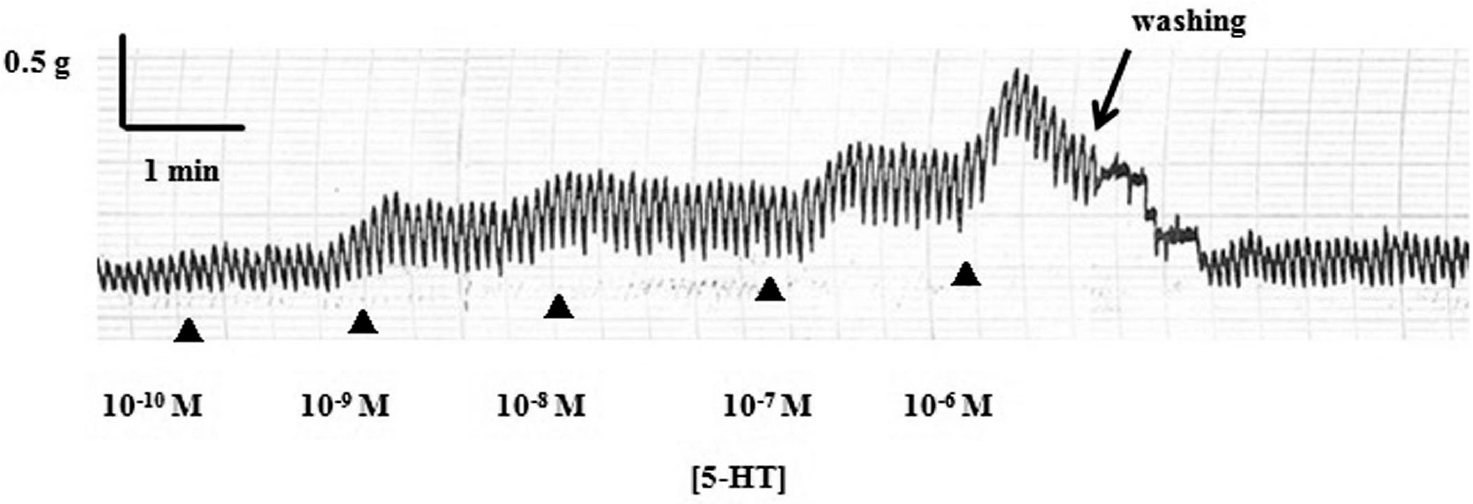 | Fig. 1.Representative tracing showing the effect of 5-HT on the spontaneous contraction of feline longitudinal smooth muscle. 5-HT was added cumulatively (10–10∼10–6 M) with 5-min contact time for each concentration. |
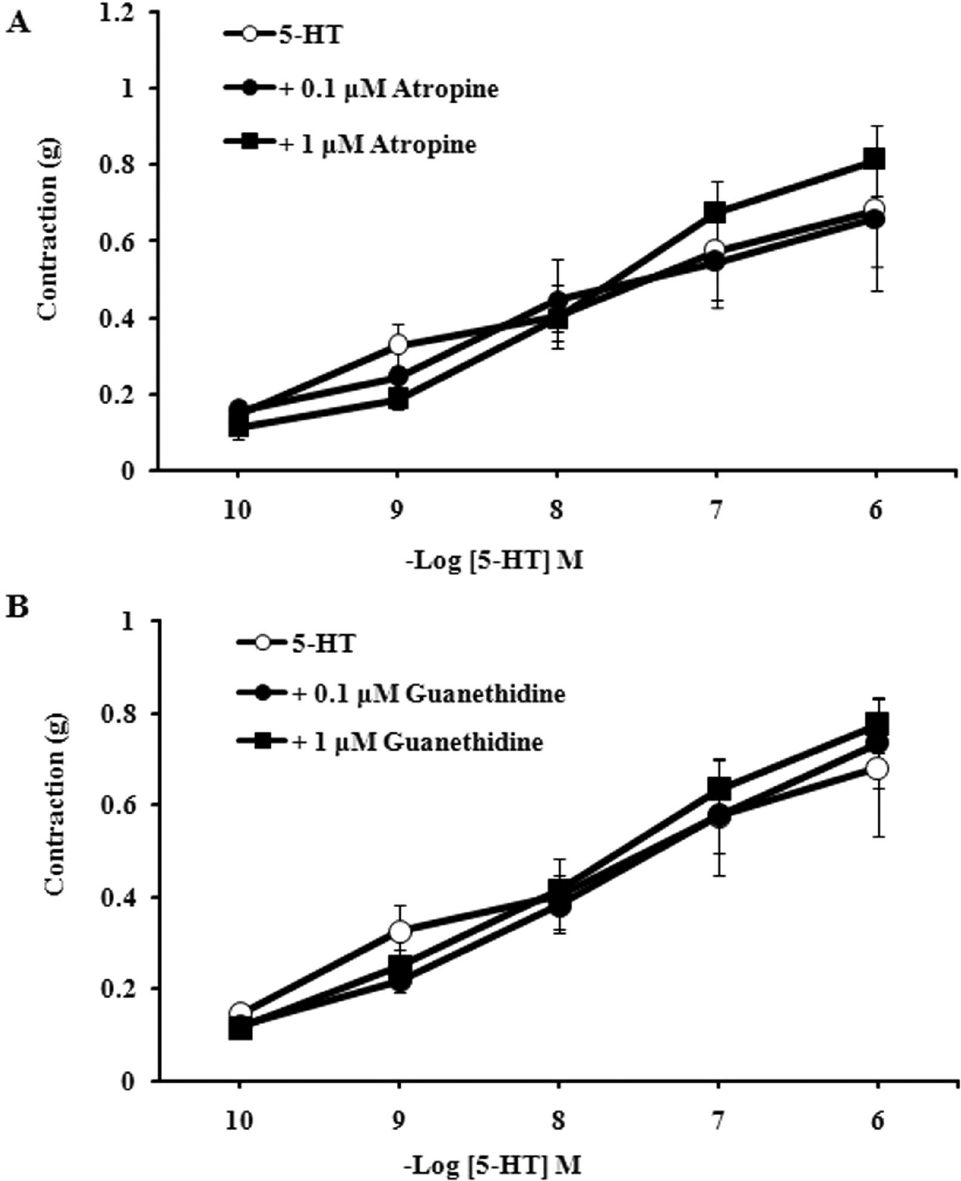 | Fig. 2.Effect of atropine or guanethidine on 5-HT-induced contraction. Concentration-response curves to 5-HT in the absence (❍) and presence of 0.1 μM atropine (), (A) or 1 μM guanethidine (▪), (B). Preparations were incubated with atropine or guanethidine for 10 min before and during 5-HT treatment. Each point represents the mean±S.E.M. (n=6). |
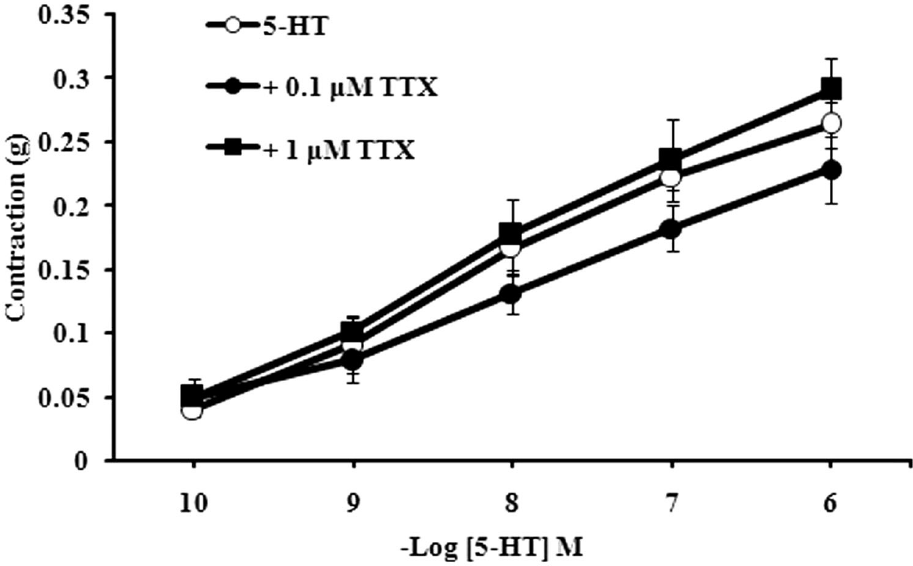 | Fig. 3.Effect of TTX on 5-HT-induced contraction. Concentration-response curves to 5-HT in the absence (❍) and presence of 0.1 μM () and 1 μM (▪) TTX. Preparations were incubated with TTX for 10 min before and during 5-HT treatment. Each point represents the mean±S.E.M. (n=5). |
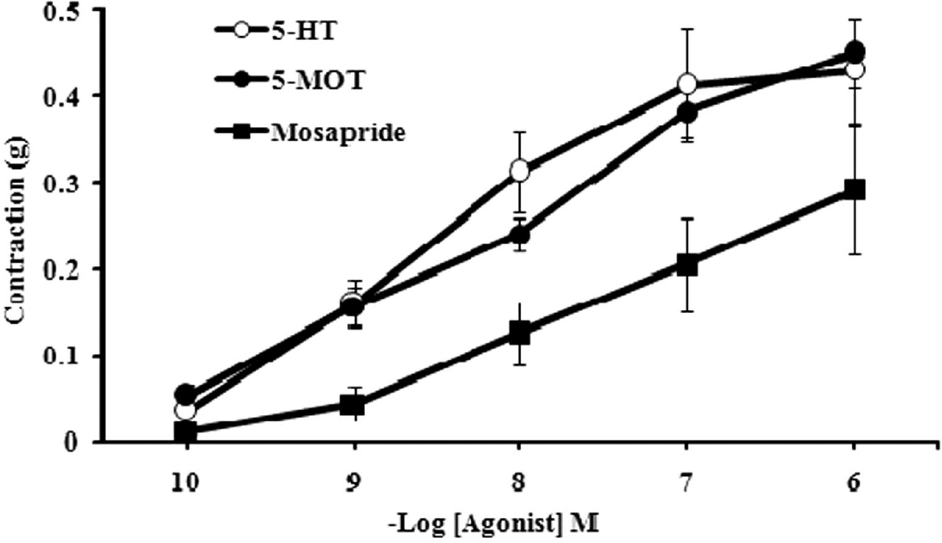 | Fig. 4.Concentration-response curves for 5-HT- (❍, n=11), 5-MOT-(, n=8) and mosapride- (▪, n=10) induced contraction. Each point represents the mean±S.E.M. |
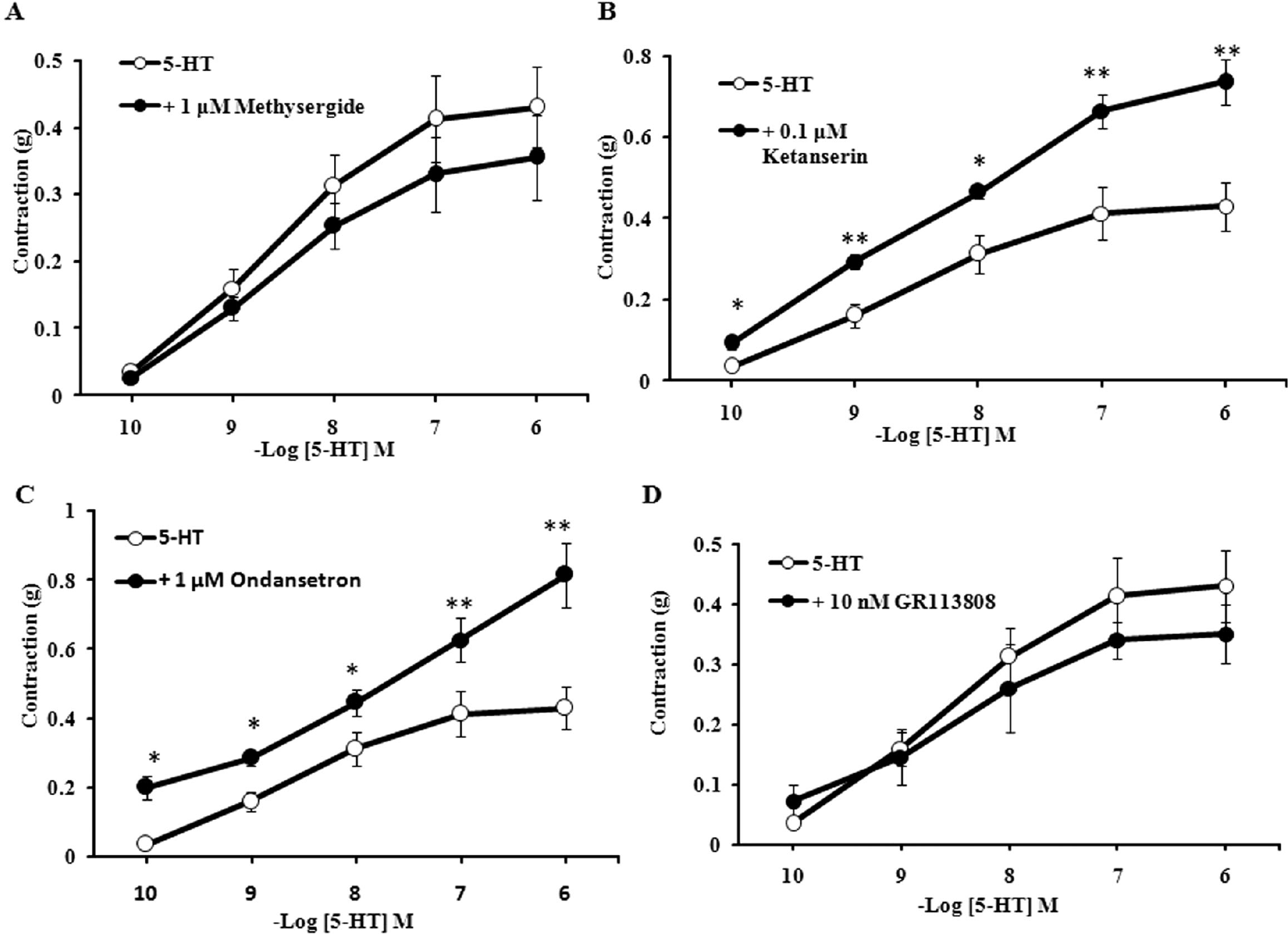 | Fig. 5.Inhibitory effect of 5-HT receptor antagonists on 5-HT-induced contraction. The preparation was incubated with (A) methysergide (1 μM, n=5), (B) ketanserin (0.1 μM, n=8), (C) ondansetron (1 μM, n=8) or (D) GR113808 (10 nM, n=5) for 30 min before and during 5-HT treatment. Absence (❍) or presence () of antagonist. Each point represents the mean±S.E.M. ∗p<0.05 and ∗∗p<0.01 compared to the same concentration of 5-HT-induced contraction alone. |




 PDF
PDF ePub
ePub Citation
Citation Print
Print


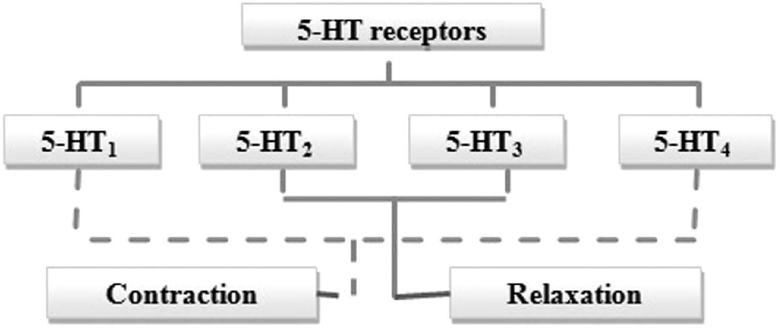
 XML Download
XML Download